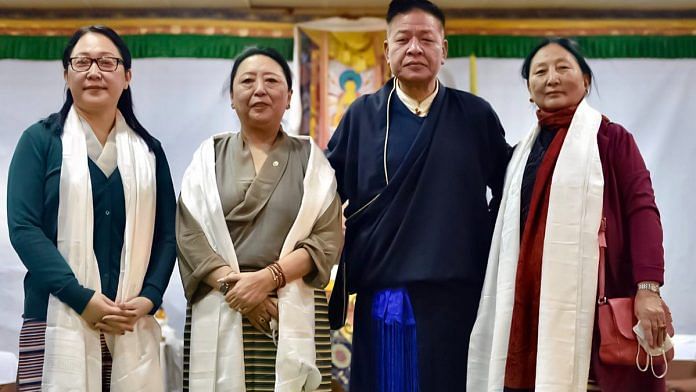New Delhi: Tibet is planning to have a “direct and official channel” of communication with the Chinese government in order to deal with Beijing effectively and firmly, according to Penpa Tsering, President of the Tibetan government-in-exile.
“We really want to play the traditional role of being a buffer but the buffer also needs this criteria of being independent between both countries. I am not sure how that can be restored. Nobody knows, we all live in hope. We want to turn Tibet into a zone of peace, that is very much the wish of Tibetans,” Tsering said at a press meet organised by the Indian Association of Foreign Affairs Correspondents (IAFAC) Friday.
“Since we have been taken for a ride for too long, we want to ensure as to who we are dealing with (in the Chinese government) and preferably we would like an official channel to communicate what the Chinese government wants to tell us and what we need to tell them,” he added.
He, however, said the issue is still in nascent stages and they are currently “structuring” their approach in order to ascertain “what positions” they would need to take if and when “China reaches out” and also if they don’t reach out to the Tibetan community.
“Until such a solution is found for Tibet our approach will be to understand what is going on inside Tibet,” he said, adding that this is all the more important as the number of people coming from Tibet to India has gone down “drastically” in the last few years.
He said, before 2008, about 2,000-3,000 Tibetans used to visit India every year, which came down to five last year. This year, he said, only nine people from Tibet have visited India so far.
He also said it is imperative for Tibetans to follow the “middle path” so that they can protect their culture, language, environment and follow their religious beliefs.
Tsering, who took over the position of Sikyong in May this year, also said that ever since Chinese President Xi Jinping visited Tibet many changes are taking place there.
“Our effort will be to reach out and whether it produces an outcome or not that’s a different matter,” he said.
He also added, “Chinese government knows that it lacks the legitimacy to rule over Tibet. That is why they keep insisting on other governments to say this over and over again… With India also it does the same.”
Also Read: Tibet won’t remain a side issue for long between India, China. Xi’s policies indicate
‘We are dying a slow death’
Highlighting that the use and promotion of the Tibetan language is gradually “shrinking” and the rise of Chinese language is increasing, Tsering said, while the condition of Tibetans is not as visible as the Uyghurs, “We are dying a slow death”.
“Genocide in whatever form, whatever speed… We are dying to slow death. In religion also, the number of monks and nuns have come down drastically … There are a lot of restrictions on the movement of monks and nuns because they are considered to be a threat by the (Chinese) government,” he said.
He added that while the Chinese “don’t give any importance” to the living Dalai Lama, Beijing is “more concerned” about the next Dalai Lama.
Students and cadres of the Chinese Communist Party are now being barred from visiting monasteries in Tibet, he said.
Tsering also said India should take “more positive steps” in order to protect and safeguard Tibetans settled in Karnataka, Arunachal Pradesh, Uttarakhand and Ladakh.
“There has to be a clear-cut strategy (by India) for the people to be able to stay and live there,” he added.
Also Read: Tibet, Buddhism, India-Pak tension — 3 factors that define China’s foreign policy in South Asia



